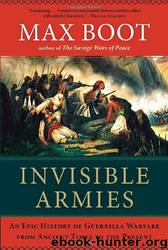Invisible Armies: An Epic History of Guerrilla Warfare From Ancient Times to the Present by Max Boot

Author:Max Boot [Boot, Max]
Language: eng
Format: epub, mobi
Tags: military, History, Other
ISBN: 9780871403506
Google: C_vdg8lBILAC
Amazon: 0871404249
Publisher: Liveright
Published: 2013-01-15T00:00:00+00:00
TEMPLER WAS TO get the powers that Briggs lacked, and he was to make full use of them. He had a mischievous, fun-loving side, but normally it was well hidden. Mostly he came across as imperious, demanding, driven—not someone who suffered fools gladly. During the desperate fighting of the 1944 Battle of Anzio, where he was a division commander, he had been nicknamed the Scalded Cat. He brought the same “electrifying” impact to Malaya, where he was appalled by the indolent attitude of many bureaucrats and planters—“chairbound . . . dunderheads,” one correspondent called them, while the colonial secretary acerbically noted that many were “varnished with port and pickled with gin.”146
When called upon to deliver a speech at an exclusive Kuala Lumpur club, Templer berated his privileged listeners, telling them that Communists “seldom go to the races. They seldom go to dinner parties or cocktail parties. And they don’t play golf!” He threatened to close down another club until it admitted “natives.”147
Templer’s “brusque” directives, criticisms, and questions, delivered in a “clipped harsh voice,” offended some; he was not afraid to tell an official who had earned his ire that he was a “stinker” or “no bloody good.” But most were impressed by his “dynamic and sometimes abrasive personality.” One district officer came away from a meeting “feeling like an electric torch which has just been filled with new batteries.”148
As he explained in a letter to the colonial secretary, Templer did his best to drive bureaucrats “out of their offices and make them talk about the Emergency with the people on the ground, in whose head ultimately lies the solution.”149 Taking his own advice, he made a habit of roaming the country in an armored car, giving scant advance notice of his arrival to military units or villages, so they could not tidy up things. When he saw things that needed correcting, as he frequently did, he issued memoranda typed in red with a deadline for action. These “red minutes” delivered by dispatch riders were an echo of Winston Churchill’s wartime memos marked “Action this day”—and just as effective in galvanizing a hidebound bureaucracy.
Templer secured his place in counterinsurgency history with his emphasis on political, rather than kinetic, warfare. “The shooting side of the business is only 25% of the trouble,” he often said, “and the other 75% lies in getting the people of this country behind us.”150 Even more famously, he declared, “The answer lies not in pouring more troops into the jungle, but in the hearts and minds of the people.”151 This phrase echoed, no doubt inadvertently, lines written in 1776 by the British general Sir Henry Clinton (“gain the hearts and subdue the minds of America”) and by John Adams in 1818 (“The Revolution was in the minds and hearts of the people”).152 Not until Templer used it, however, did “hearts and minds” turn into a byword and later a cliché. (That “nauseating phrase,” as Templer called it in 1968, was to become a particular favorite of Lyndon Johnson’s.
Download
Invisible Armies: An Epic History of Guerrilla Warfare From Ancient Times to the Present by Max Boot.mobi
This site does not store any files on its server. We only index and link to content provided by other sites. Please contact the content providers to delete copyright contents if any and email us, we'll remove relevant links or contents immediately.
Whiskies Galore by Ian Buxton(41994)
Introduction to Aircraft Design (Cambridge Aerospace Series) by John P. Fielding(33120)
Small Unmanned Fixed-wing Aircraft Design by Andrew J. Keane Andras Sobester James P. Scanlan & András Sóbester & James P. Scanlan(32789)
Craft Beer for the Homebrewer by Michael Agnew(18237)
Turbulence by E. J. Noyes(8040)
The Complete Stick Figure Physics Tutorials by Allen Sarah(7363)
The Thirst by Nesbo Jo(6932)
Kaplan MCAT General Chemistry Review by Kaplan(6926)
Bad Blood by John Carreyrou(6611)
Modelling of Convective Heat and Mass Transfer in Rotating Flows by Igor V. Shevchuk(6433)
Learning SQL by Alan Beaulieu(6280)
Weapons of Math Destruction by Cathy O'Neil(6265)
Man-made Catastrophes and Risk Information Concealment by Dmitry Chernov & Didier Sornette(6005)
Digital Minimalism by Cal Newport;(5749)
Life 3.0: Being Human in the Age of Artificial Intelligence by Tegmark Max(5547)
iGen by Jean M. Twenge(5408)
Secrets of Antigravity Propulsion: Tesla, UFOs, and Classified Aerospace Technology by Ph.D. Paul A. Laviolette(5366)
Design of Trajectory Optimization Approach for Space Maneuver Vehicle Skip Entry Problems by Runqi Chai & Al Savvaris & Antonios Tsourdos & Senchun Chai(5066)
Pale Blue Dot by Carl Sagan(4996)
